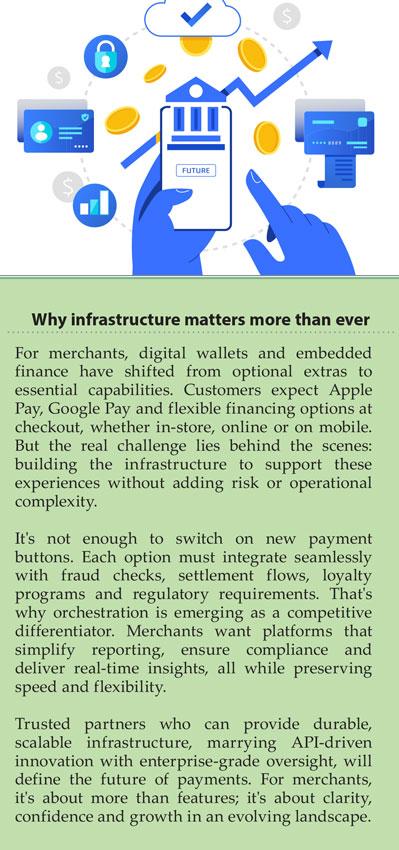The Green Sheet Online Edition
August 25, 2025 • 25:08:02
How wallets and embedded finance are reshaping merchant-acquirer value

The payments world is evolving fast, and for merchants, the role of infrastructure is more important than ever. Digital wallets and embedded finance have moved from the margins into the mainstream. The next generation of merchant value is being built on speed, flexibility and control. The partners who can deliver that without compromising risk or compliance will lead the pack.
At Lloyds Merchant Services, we see this shift up close. From fast-growing ecommerce businesses to global retail platforms, merchants want payment acceptance that works wherever their customer is: in-store, on mobile or at the digital checkout.
Wallets like Apple Pay and Google Pay are now standard expectations, not optional add-ons. Embedded finance tools like BNPL and installment plans are reshaping the checkout conversation, giving customers more control and giving merchants new ways to convert.
But enabling this shift means building smarter infrastructure behind the scenes. It's not just about adding another button at checkout. It's about how that option integrates with risk rules, settlement flows, fraud checks and loyalty programs, as well as how easily it works across channels and geographies.
Wallets and embedded finance are now table stakes at the POS
At our recent Payments Disrupted forum, co-hosted with Visa, industry leaders made one thing clear: wallets and embedded finance are part of a broader push for frictionless, contextual commerce. The merchants of tomorrow want payment systems that flex with their customers. And they want a partner who can help them do that securely and compliantly.
That's what merchants are looking for now: embedded payment capabilities that don't create new points of failure. For example, many retailers are asking for real-time payment routing based on customer preference and channel. Some want to tokenize loyalty benefits directly into the wallet flow. Others want embedded lending options that are SCA-compliant, regulated and approval-rate optimized.
This is where the value of regulated infrastructure shines. With increased scrutiny on deferred payment models and evolving mandates around Consumer Duty, merchants are looking to banks and trusted providers to offer compliant finance, not just flashy integrations. An approach that works is to combine API-based flexibility with enterprise-grade onboarding, risk and compliance oversight.
Today's merchant services platforms need to serve acquirers and partners who care about durability as much as UX. That includes multi-channel readiness, from countertop POS to mobile-enabled commerce, and partnerships with payment solution leaders like FreedomPay and Fiserv to ensure real-world integration support.
Orchestration, not aggregation: The real value for merchants
The real game-changer, however, is how easily all of these services can be integrated under one roof. As more embedded finance options appear, merchants risk being flooded with separate dashboards, disjointed flows and unclear liabilities. Those providers who can orchestrate those flows, ensuring real-time reporting, unified reconciliation and clear escalation paths, will stand out.
Embedded finance solution FlexPay is built on that principle. It's not a bolt-on; it's a configurable, risk-aware service that helps merchants offer more ways to pay, while preserving full transparency and control, and it can come with the assurance of full regulatory governance, robust affordability logic and merchant-aligned data ownership.
Digital wallet acceptance is another major area where merchants can differentiate. The best experiences happen when wallets integrate seamlessly with loyalty, fraud controls and settlement processes, not when they're simply 'switched on.' That's why it's ideal to offer wallet acceptance with embedded compliance, reporting and service design input, not just access.
This creates real differentiation. The ability to help merchants offer flexible finance is a serious advantage, particularly for enterprise and mid-market customers who care about risk exposure and data access.
From a technical point of view, the ideal platform will support real-time authorization flows, multi-wallet acceptance, advanced tokenization and flexible settlement arrangements, all tuned for the operational realities of omnichannel merchants. This infrastructure is the foundation for the next wave of checkout innovation.
Importantly, there's also growing interest from merchants in embedded finance not just as a payment tool, but also as a retention strategy. Whether it's enabling customers to split payments, or offering personalized finance options for loyal customers, the demand is growing. And providers who deliver that—safely, smartly and with scale—will be the ones merchants want to grow with.
Helping acquirers turn complexity into scalable merchant value
The future of payments won't be defined by terminals or fancy dashboards. It'll be defined by enablement. Merchants want payment journeys that feel like an extension of their brand, and which simplify the operational lift of doing so. They also want reassurance that compliance and scalability are built in without slowing things down.
Through flexible wallet integrations, embedded finance options and an ecosystem built on merchant-first design, merchant services providers can help merchants to stand out. Because in a crowded market, the differentiator isn't just technology. It's trust, simplicity and the ability to turn complexity into clarity.
And that's what the next generation of payments will demand, not just from merchants, but also from the acquirers and processors that serve them. The partners who deliver seamless finance at the point of need; the platforms that deliver more than access—they deliver performance, transparency and growth. 
Ross Taylor is managing director, Sales and Portfolio Management at Lloyds Merchant Services. Contact him via LInkedIn at linkedin.com/in/ross-taylor-5869104.
Notice to readers: These are archived articles. Contact information, links and other details may be out of date. We regret any inconvenience.





